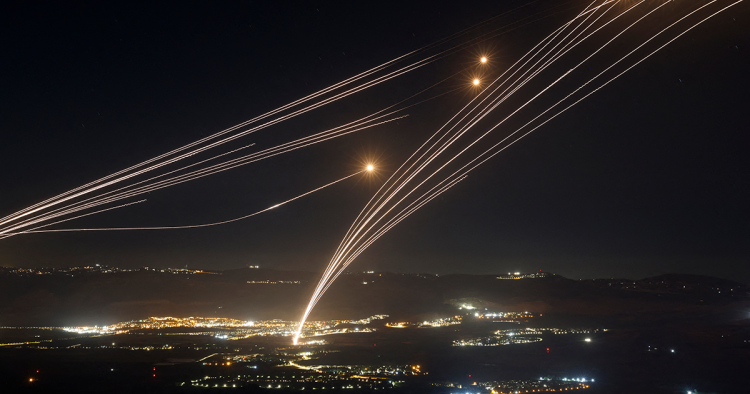Contents:
- The Middle East is the closest it has ever been to an all-out war
- Mixed signals from unclear US policies helped produce this moment in the Middle East
- Egypt watches the gathering storm uneasily
- Haniyeh assassination only the latest source of Turkey-Israel tensions
- Afghanistan and Pakistan align responses to Haniyeh’s death with national priorities
The Middle East is the closest it has ever been to an all-out war
Randa Slim
Senior Fellow and Director of Conflict Resolution and Track II Dialogues Program

-
The nature of the killings of Hezbollah commander Fuad Shukr and Hamas leader Ismail Haniyah has ensured a retaliatory response; while the timing and form of that retaliation are not yet clear, it will likely involve all of the factions of the “Axis of Resistance.”
-
The US administration has lost control over its ally and the fear of its opponents, meaning Washington has only limited, if any, impact on the cost-benefit escalation calculus of the fighting sides.
The assassination of Hezbollah commander Fuad Shukr on July 30, immediately followed by the assassination of Hamas leader Ismail Haniyah the next day, was a double and humiliating blow to Iran and the “Axis of Resistance.” The fact that the two assassinations took place in Hezbollah’s stronghold and the Iranian capital, respectively, ensured a retaliatory response from both Tehran and Hezbollah. Public statements by Iranian Supreme Leader Ayatollah Ali Khamenei and Hezbollah Secretary-General Hassan Nasrallah to that effect leave no room for negotiations with either on the possibility of standing down.
We can only speculate about the timing and form of their retaliation. The day after Haniyah’s assassination, the leaders of the resistance axis, who were in Tehran to attend the inauguration of Iranian President Masoud Pezeshkian, met to decide on the response. The fact that it was an Axis of Resistance meeting implies that the retaliatory response will most likely involve all of its factions.
Hassan Nasrallah said in his Aug. 1 speech that the Hezbollah-Israel conflict has entered a new stage. By that he meant the rules that have anchored Hezbollah’s conduct of the cross-border war with Israel, including non-targeting of major cities and of civilian areas, have been upended. Their retaliatory response to Shukr’s assassination will follow the new rules.
The US administration has proven unwilling and unable to rein in its Israeli ally. Following the two assassinations, they were quick to declare they had no role in Shukr’s killing and were neither aware of nor involved in Haniyah’s. The takeaway inside the Iran-led resistance axis from such statements is that they can no longer rely on Washington to prevent a regional war.
To-date, the Axis of Resistance has been uninterested in launching such a war. Iran is in the midst of a succession crisis, while Hezbollah and Lebanon are dealing with a massive economic crisis. Neither wants to direct international public interest and support away from the Palestinians, nor do they want to get into a war with the US. However, both know the Biden administration is keen on preventing an all-out regional war. They are also aware of the limited maneuvering room of an administration that is leaving office in five months. It can neither offer incentives for Iran and its proxies to stand down nor does it seem capable of preventing Israeli escalatory behavior.
After 10 months of Israel’s war on Gaza, the US administration has lost control over its ally and the fear of its opponents. As a result, Washington has only limited, if any, impact on the cost-benefit escalation calculus of the fighting sides. The Middle East is today the closest it has ever been to an all-out multi-front regional war.
Follow: @rmslim
Mixed signals from unclear US policies helped produce this moment in the Middle East
Brian Katulis
Senior Fellow for US Foreign Policy

-
America sends more military reinforcements to the Middle East amid heightened threats of war from Iran and its regional network
-
In this uncertain environment, the Biden team continues to prioritize diplomacy and de-escalation in its strategic communications and messaging
The Biden administration prepared for a widening regional war even as it continued to talk peace this past week.
The Pentagon announced it was sending additional warships, combat aircraft, and anti-ballistic missile defense systems to the Middle East in order to prepare for possible attacks by Iran, Hezbollah, and other Iran-aligned groups in reaction to the killing of leaders from Hezbollah and Hamas last week.
US military officials stressed that these measures were defensive in nature, seeking to boost US force protection in the region and support partners like Israel from increased threats. Gen. Michael Kurilla, the top US military commander in the Middle East, is currently in the region consulting with key US partners to prepare for another round of attacks from Iran and its regional network.
Even as it prepared for a wider conflict in the region, the Biden administration continued to prioritize diplomacy and moves to calm the situation. Biden’s Deputy National Security Advisor Jon Finer said that the administration was preparing for every possibility, but that it still saw the goal of achieving a cease-fire between Israel and Hamas as the lynchpin to stabilizing the region.
Last Thursday, President Joe Biden spoke with Israeli Prime Minister Benjamin Netanyahu in what some described as a “tough” telephone call about the need to move toward a cease-fire deal and to avoid a wider regional escalation. Talks in Cairo this past weekend on that possible cease-fire deal as well as addressing some complicated security questions along the Israel-Egypt-Gaza border did not appear to produce any significant progress.
The key drivers of events in the Middle East today are Iran, its network of partners (including Hezbollah, Hamas, and the Houthis), and Israel. The United States remains the most important external actor, but the mixed signals in unclear policies have produced incentives for the key regional actors to test the limits of their power and influence, usually through military force and other kinetic actions.
When the Biden administration entered office in 2021, the Middle East ranked fairly low on its list of overall priorities, though it stepped up its engagement in the region in 2022 and 2023, as this September 2023 report examined. The war that Hamas started by attacking Israel on Oct. 7, 2023, pushed the Biden administration into a reactive, crisis management mode on the Middle East. It outlined several priorities for its regional policy, and many of these have been in tension with one another. For example, the goal of supporting Israel’s self-defense was at times in tension with the objective of protecting Palestinian civilians. In addition, deterring Iran and its partners from attacks that could lead to a regional war was not always compatible with the other stated goal of de-escalation, because de-escalation as a posture sometimes incentivized Iran to conduct retaliatory strikes, the opposite of deterrence. As a result, the Biden administration’s performance in achieving its policy goals has declined as the war nears its 10-month mark.
The United States seems further away from getting a cease-fire and hostage release deal and closer to seeing a widening regional war unfold.
Follow: @Katulis
Egypt watches the gathering storm uneasily
Mirette F. Mabrouk
Senior Fellow and Founding Director of the Egypt program

-
At this point, nobody is holding their breath that the ongoing Gaza cease-fire talks will reach an agreement.
-
Egypt is also worried about the conflicts piling up on its borders and the potential economic and military fallout from a broader regional conflagration.
Egyptian television host Ahmed Moussa’s program “Ala Mas’ouleyety” has both its supporters and its detractors, but on Aug. 3, he made a comment that the majority of Egyptians could agree on. “An [Iranian] response is coming,” he said. “Today, tomorrow, but it is coming. Honestly, we’re all just waiting.”
So is the rest of the world. Moussa was, of course, referring to an Iranian response to the assassination of the head of Hamas’ political arm, Ismail Haniyeh, in Tehran, allegedly by Israel. For its part, Israel has not commented (which is par for the course in the case of an extrajudicial execution in a foreign country), but no one is pretending otherwise. The United States has failed to temper Israeli escalation to any tangible degree despite enormous military and diplomatic support. At a White House meeting with Israeli Prime Minister Benyamin Netanyahu last month, US President Joseph Biden apparently pressed Netanyahu to de-escalate and work immediately toward a cease-fire. Shortly afterwards, Israel assassinated Haniyeh, a major player in the cease-fire negotiations. The US has since had to resort to sending more warships, fighter jets, and missile defense systems to the Middle East to defend Israel (and its own interests).
Several countries are attempting to defuse the situation, among them Egypt. The new minister for foreign, immigration, and Egyptian expatriate affairs, Badr Abdelatty, has spoken with his Iranian counterpart Ali Bagheri Kani to convey Egypt’s stance on the matter and reiterate the need for de-escalation. More urgently, Egyptian negotiators have been meeting with their Israeli counterparts to attempt to hammer out a cease-fire agreement for the Gaza conflict.
At this point, nobody is holding their breath though. According to Axios, Mossad Director David Barnea and Shin Bet Director Ronen Bar had been scheduled to travel to Egypt last Thursday for talks with Egyptian Intelligence Director Abbas Kamel. Not surprisingly, Egypt considered the optics and decided the meeting couldn’t go ahead until after Haniyeh’s funeral. However, Biden’s top Middle East adviser, Brett McGurk, apparently pressed both sides to push ahead with the cease-fire talks. Neither side is especially hopeful. Egyptian negotiators have privately described the talks as being like “trying to carry water in a colander.” Israeli negotiators are apparently similarly frustrated; negotiators told Axios that Netanyahu apparently keeps moving the goalposts on the terms to stall any deal, and that he’s only agreed to discussions to ostensibly appease Biden.
Matters are being further aggravated by Egypt having to refute claims being made in the Israeli media that the Israeli Army “has found operations tunnels between Egypt and the Gaza Strip.” The situation is getting progressively testier and Egypt is already dealing with conflicts on three of its borders. The last time Iran retaliated for an Israeli assassination this past April, it was with an outwardly large display of drones and missiles that was, in reality, carefully measured and resulted in only one fatality — a deliberate and calibrated response that would not escalate an ongoing conflict. This time, that kind of restraint might not be on offer.
Egypt is trying to juggle myriad and conflicting challenges: a beleaguered Palestinian population that has immense domestic support; Israel, an ally it can neither influence nor control, that seems bent on escalating a conflict and forcing others to choose sides; and the potential economic and military fallout from a broader regional conflagration, including a spike in attacks in the Red Sea.
Follow: @mmabrouk
Haniyeh assassination only the latest source of Turkey-Israel tensions
Howard Eissenstat
Non-Resident Scholar

-
The assassination of Hamas political head Ismail Haniyeh was, no doubt, a shock to Ankara and its response has been sharp, including a strong condemnation from President Recep Tayyip Erdoğan and the declaration of a national day of mourning.
-
Although Turkey-Israel relations have been steadily worsening amid the Gaza war and Erdoğan has adopted a harder stance since the March 31 municipal elections, Turkey is unlikely to take any radical steps on its own following the killing.
For Turkish officialdom and the Turkish community more broadly, the importance of the Palestinian cause is hardly in question and has been a long-standing source of tension, both between Turkey and Israel and between Turkey and its Western allies. Moreover, the question of Palestine is absolutely central to the worldview and public image of Turkey’s president, Recep Tayyip Erdoğan.
In the immediate aftermath of Hamas’ attack of Oct. 7, Erdoğan barely mentioned the civilian losses that Israel suffered but was fulsome in his denunciation of its response. As Israel repeatedly attacked civilian infrastructure in Gaza and civilian casualties mounted, Erdoğan won plaudits in the wider Muslim world for his powerful condemnation of both Israeli war crimes and Western hypocrisy.
Initially, he was loath to take tangible steps against Israel. There are three reasons for this. First, he did not want to get ahead of many of his Middle Eastern partners, particularly those in the Gulf, who balanced their concern for the Palestinians with a distaste for Hamas and who were primarily concerned with limiting Iranian influence in the region. Turkey had only recently restored warm relations with countries like the United Arab Emirates and Saudi Arabia, and he badly needed their goodwill and foreign investment. Second, trade with Israel — which had continued unabated despite often tense relations — was both important for Turkey’s economy and a reassurance to Ankara’s Western allies. Third, Erdoğan initially thought Turkey might play some central role in brokering a cease-fire. In the end, however, Israeli officials have so little trust for Ankara at this point that its role turned out to be quite marginal.
Since the March 31 municipal elections, Erdoğan has taken a harder stance with Israel, sharpening his rhetoric and cutting most economic relations (but not halting the flow of oil from Azerbaijan to Israel through Turkey). Only last week, he told a gathering of Justice and Development Party (AKP) dignitaries that Turkey might intervene directly in support of Hamas (this is, to put it mildly, unlikely). The assassination of Hamas’ political head, Ismail Haniyeh, in Tehran on July 31 was, no doubt, a shock to Ankara. Haniyeh had good relations with the AKP’s inner circle, spent considerable time in Turkey, and was even reputed to have been given Turkish citizenship. Needless to say, Turkey’s response has been sharp. Erdoğan has condemned what he calls “Zionist barbarism” and a national day of mourning was declared for Aug. 2, with mass demonstrations and flags flown at half-mast.
As Turkey scholar Sinem Adar noted, Turkey seems to have been disappointed that there has been no wider global response to the assassination, which it had expected to be stronger and help undergird an emerging multi-polar order. China and Russia, which it sees as central to such an order, offered only milquetoast condemnations of Haniyeh’s assassination.
It is unlikely, however, that Turkey will take radical steps on its own, nor is it likely to directly support any retaliation on the part of Iran or its proxies. While it does not see in Iran the regional threat that some of its allies do, neither is Turkey going to fully enter into the Iranian “Axis of Resistance.” Above all else, Turkey wants to ensure its own strategic independence; and it needs stability and good relations as it rebuilds its tattered economy. Erdoğan’s rhetoric — and no doubt his heart — is with the Palestinians; but strategic realities will limit any practical steps.
Afghanistan and Pakistan align responses to Haniyeh’s death with national priorities
Marvin G. Weinbaum
Director, Afghanistan and Pakistan Studies

-
While Kabul and Islamabad both strongly condemned the killing of Hamas political leader Ismail Haniyeh, the two countries have been mostly measured in their response, shaped by their national narratives and how their actions will be received internationally.
-
Despite a shared affinity with Hamas, the likelihood of the Taliban joining hands with Iran in taking revenge for the killing of the Hamas leader is doubtful; for its part, Pakistan’s official reaction has been primarily diplomatic.
Afghanistan and Pakistan have joined other Muslim-majority countries in their strong condemnation of the assassination of Hamas political chief Ismail Haniyeh in Iran. Both back Iran’s call for an emergency ministerial meeting of the Organization of Islamic Cooperation to rally support for what Tehran deems its "inherent and legitimate" right to retaliate against Israel's "blatant crime." Yet the two countries have also been mostly measured in their response. They have reason to be cautious about their involvement with the Gaza war. Unlike Iran, their calculations are not those of a country embroiled in a regional power struggle. Nor do they feel similarly compelled to seek revenge on Israel on behalf of Hamas. Official reactions from Kabul and Islamabad to the recent events are peculiar to their national narratives and sensitive to how their actions will be received internationally.
The Afghan Taliban have delivered a message rooted in the country’s transnational Islamic ideological rhetoric. The Kabul government praised Haniyeh as a pious mujahid, calling his killing a significant loss for the Islamic community and the jihadist movement. The Afghan Taliban have an affinity with Hamas, sharing with it a like jihadi ideology. That bond has no doubt been strengthened by Haniyeh’s assassination. Last month, it was reported that Iranian and Afghan foreign ministers discussed "joint action" against Israel in support of Hamas, with the Taliban leader supposedly informing Tehran about their readiness to deploy thousands of troops to fight against Israel. Still, the likelihood of the Taliban joining hands with Iran in taking revenge for the killing of the Hamas leader is doubtful. Aside from their historic sectarian differences, the two countries have little mutual trust and are engaged in a number of bitter interstate disputes. Moreover, as the stakes in Iran's conflict with Israel rise with the American announced determination to defend Israel, the Taliban may think twice before reviving battle with the US, its long-standing adversary and now, albeit indirectly, economic benefactor.
Pakistan’s official reaction to last week’s events has been primarily diplomatic. It has condemned Israel for Haniyeh’s extraterritorial and extrajudicial killing, and for “adventurism.” A resolution in support of Hamas unanimously passed in the National Assembly, and the international community was called upon to hold Israel accountable. But absent is any promise of material assistance. The Pakistan military has its hands full combatting insurgency and terrorism at home and has so far carefully avoided comment on the recent developments. Like the government, it is anxious not to appear to strongly side with Iran. The military values US assistance for its counter-terrorism efforts, and the country’s economy can ill afford to incur sanctions by Washington, especially after it just secured a new $7 billion loan program from the International Monetary Fund. All the same, the public’s long lasting religious and emotional attachment to the Palestinian cause has strongly resurfaced in the wake of Haniyeh’s killing, leaving the government caught between pressure for a more robust stance and realpolitik considerations. To placate public sentiment Pakistan recently designated the Israeli Prime Minister Benjamin Netanyahu a terrorist and announced its intention to boycott international businesses supporting Israel. Never mind that doing so will probably be more costly for Pakistan than those it seeks to punish.
Interestingly, some quarters in Pakistan are tactfully weaving their anti-Israel discourse together with a more familiar anti-Indian theme. Recent statements by senior analysts, including some well-known ex-diplomats, have helped plant the idea that the Indian spy agency the Research and Analysis Wing collaborated with Israel’s foreign intelligence agency Mossad to assassinate Haniyeh. Though a conspiracy without evidence, this assertion of an Indian connection is gaining momentum as religious groups and political factions have picked up the accusation. By aligning Pakistan’s well-worn anti-Indian national narrative with the country’s hardened anti-Israel stance, it provides the opportunity to make the argument that the struggle against India to free Kashmir is as much an obligation for Muslims worldwide as is the freeing of Palestinians from Israel.
Research assistant Naad-e-Ali Sulehria contributed to this piece.
Follow: @mgweinbaum
Photo by JALAA MAREY/AFP via Getty Images
The Middle East Institute (MEI) is an independent, non-partisan, non-for-profit, educational organization. It does not engage in advocacy and its scholars’ opinions are their own. MEI welcomes financial donations, but retains sole editorial control over its work and its publications reflect only the authors’ views. For a listing of MEI donors, please click here.













